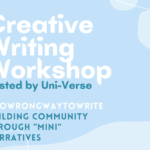by Holly Girling
Tara can roll a blunt with one hand. With her other hand she fixes the sock crumbled in her shoe. These aren’t her shoes. They were her mother’s. These aren’t her socks. They were her brother’s. Tara doesn’t let herself recall either fact. Instead, she uses her lighter to bake her blunt. She runs the flame back and forth and back and forth, to encourage an even burn. This is her last dime bag and she doesn’t want to waste a single drag. She examines her final product with pride. She’s good at this.
Tara wasn’t good at many things growing up. She wasn’t particularly bad at things. She just wasn’t very good. She got almost average grades. She played a couple of sports growing up, the usual ones; soccer, softball, field hockey. She stood in the field watching the other kids play. She didn’t get it. What was so exciting about running after a ball? She didn’t like to dance or sing either. She didn’t have many friends, but a couple. There was Katarina, whose eyes were shaped like eggs. And there was Timmy. Timmy and Tara were supposed to get married and live happily ever after with a million kids and a billion puppies—well according to their pact in the third grade. It’s been a while since Tara thought about those two, Katharina and Timmy. She takes a drag, holds it in for a while until her eyes feel as though smoke were coming out of them and then exhales. Where are they now? She wonders.
She’s sitting on a swing. This was the swing her father took her to when she was five years old. There used to be a clipping from the local newspaper taped onto the wall in her dad’s office. The picture is of him, with shoulder-length hair and a mustache, and her, five years old with pigtails. He is pushing her on this very swing so high, higher than the sky! She remembers him saying that. Higher than the sky. She chuckles to herself and sucks in more smoke.
There’s no one here anymore. The swing creaks the way it always has but the chains whine as if begging Tara to leave too. Or maybe the swing sings to her, afraid of being alone. Nothing else in the playground survived. The plastic tunnels and slides melted in one of the recent blasts. The ground used to be protected by shredded rubber but now the pieces have scattered so far that Tara can see the dead grass beneath. There is no fence, but was there ever one? Tara is unsure. She finds it hard to remember the town before all this…shit. Another drag.
Tara gets up from the swing and watches it sway to a stop. There is no wind. Tara looks to the trees in the nearby forest whose leftover leaves hang still in the air. She walks to the road separated with cracks and waits for a sound. Any sound. She can hear the last of her weed burning but that is it. Tara drops the blunt to the ground and stomps on it with her mother’s sneakers. She recognizes silences like these. This is the silence she heard when her father held her little brother, caressing his head and moving his lips as if making a final prayer. This is the silence she heard before her mother’s final word. Then Tara remembered that word, “Run.”
Tara broke out in a sprint towards the forest. “Run.” She tripped over a fallen branch. She rolled in the dried leaves and jumped back onto her feet. “Run.” She heard what sounded like thunder break the silence and break the still air, only she knew by now it was not thunder. Tara kept her eyes on the ground, watching her mother’s shoes dodge rocks and branches and thorns. She watched the ground rumble with the impact of whatever followed the thunder. She still wasn’t sure what to call them—missiles? Bombs? No time to think. “Run.” Tara ran so fast that she couldn’t breathe, but she didn’t need to—her mother’s voice was commanding her. “Run.” The leaves were making all kinds of sounds now, crackling sounds. Tara was afraid to look behind her. The thick air was moving and it was suddenly very hot. Tara ran. Tara ran until she reached a clearing in the forest. The trees ended and were replaced by a tall grass. Tara hiked her legs over its blades towards what looked like a giant concrete box. Tara could feel the heat behind her on the back of her neck.
Tara got closer to the concrete structure and her steps slowed to a sort of creep. There was a steel door about twice her height, with no knob or bell or anything. Just a giant steel rectangle attached to this big grey square building in the middle of a forest. Tara crept closer. Her mother’s voice was quieter now. Her head began to spin; the grass was in the sky and the trees were on her legs and the crackling was in her hair and the heat was getting hotter and hotter and hotter and the steel door—that steel door. What was behind the steel door? Tara found herself standing in front of it, her knuckles already touching the cold surface. All she could think to do was knock. Knock. Knock. The trees at the end of the field were burning but Tara was frozen. There was nowhere to run. She knocked louder. Knock. Knock. Then, faster. Knock. Knock. Knock. She raised both of her fists in the air ready to slam the door and scream and cry and beg and howl—but first, the door opened.








